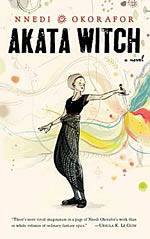
![]() Selchie
Selchie
1/9/2013
![]()
I don't normally read young adult fiction but the unusual subject matter made this book an exception for me. I've always enjoyed world mythology and fantasy based in cultures other than my own. Akata Witch is an excellent example of how traditional themes can be placed in unfamiliar contexts to make a relatively simple story fascinating.
Basically it is an African Harry Potter type of story about four children with magical talents going to a secret school of sorts to learn about magic, facing various trials, and learning valuable lessons. All of this is vitally important so they will be prepared to face the evil villain that only their special group can defeat.
While the book in general, reads like it was written for a younger audience, some themes may be too dark for very young children. There is plenty for teens or even adults to enjoy, however, since it is fast paced and engagingly written.
The title refers to a girl named Sunny. Her family has returned their native country, Nigeria, but she spent the first nine of her twelve years in the US. The word 'akata' is a disparaging term for an American of African descent. As if that wasn't enough to mark her as an outsider among her classmates, Sunny is also an albino and often the target of bullying and ridicule because of her odd appearance and the need to stay out of the sun.
Eventually, she makes friends with three other outsiders near her age and is initiated into their world of magic after they discover that she is also one of the 'Leopard People' or someone with magical abilities. Along the way they learn the virtues of things like knowledge, teamwork, loyalty, and humility while gaining new skills and magical talents. At the same time, Sunny also has to deal with her own demons in the form of troubled family dynamics and learning to understand and accept herself.
While nicely done, none of this would be very remarkable or unique without the setting. I especially appreciated the diverse backgrounds of the four children and how completely centered the story was in West African folklore. All too often tales that set out to be multicultural are merely European stories with a thin veneer of ethnic imagery painted over it instead of tapping into the wealth of traditional lore from the many, many tribes and cultures indigenous to the African continent or other non-European cultures. I applaud the author for writing a Nigerian Fantasy populated with Nigerian characters.
The ending almost felt like it should have a sequel or that there was more to be told about Sunny and her friends and family but maybe that's just because she is a well written character. Being intended for a juvenile audience made it not completely to my tastes but it's well worth reading and something the whole family can enjoy together.